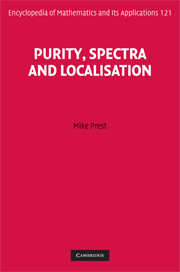Book contents
- Frontmatter
- Contents
- Preface
- Introduction
- Part I Modules
- Part II Functors
- 10 Finitely presented functors
- 11 Serre subcategories and localisation
- 12 The Ziegler spectrum and injective functors
- 13 Dimensions
- 14 The Zariski spectrum and the sheaf of definable scalars
- 15 Artin algebras
- 16 Finitely accessible and presentable additive categories
- 17 Spectra of triangulated categories
- Appendix B Languages for definable categories
- Appendix C A model theory/functor category dictionary
- Part III Definable categories
- Appendix D Model theory of modules: an update
- Appendix E Some definitions
- Main examples
- Bibliography
- Index
17 - Spectra of triangulated categories
from Part II - Functors
Published online by Cambridge University Press: 05 March 2013
- Frontmatter
- Contents
- Preface
- Introduction
- Part I Modules
- Part II Functors
- 10 Finitely presented functors
- 11 Serre subcategories and localisation
- 12 The Ziegler spectrum and injective functors
- 13 Dimensions
- 14 The Zariski spectrum and the sheaf of definable scalars
- 15 Artin algebras
- 16 Finitely accessible and presentable additive categories
- 17 Spectra of triangulated categories
- Appendix B Languages for definable categories
- Appendix C A model theory/functor category dictionary
- Part III Definable categories
- Appendix D Model theory of modules: an update
- Appendix E Some definitions
- Main examples
- Bibliography
- Index
Summary
Purity and associated ideas may be defined in compactly generated triangulated categories via their associated functor categories and also internally. Basic definitions and results on purity are presented, mostly without proof. The Ziegler spectrum of a ring is related to that of the derived category of its modules and, in certain contexts, the rep-Zariski spectrum is related to the Zariski spectrum of the cohomology ring.
Triangulated categories (Section 17.1), such as the derived category of an abelian category and the stable module category of a group ring, often arise from abelian categories but, though additive, they are almost never themselves abelian. Nevertheless, compactly generated triangulated categories (Section 17.2) are roughly analogous to locally finitely presented abelian categories and it turns out that the theory around purity can be developed for such categories (Section 17.3). This can be done via an associated functor category but can also be done directly, without reference to that associated abelian category. Krause defined the Ziegler spectrum of a compactly generated triangulated category in terms of the associated functor category and the usual connections, for instance with definable subcategories, are there (Section 17.3.1). The relevant notion of localisation is described in Section 17.4. There is some relation between the Ziegler spectrum of a ring and that of its derived category (Section 17.3.2).
- Type
- Chapter
- Information
- Purity, Spectra and Localisation , pp. 630 - 655Publisher: Cambridge University PressPrint publication year: 2009



